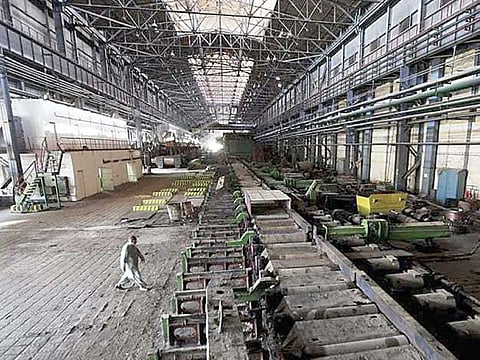End of an era for Pakistan Steel Mills
Government does away with lifeline of country’s industrial growth, 9,350 employees fired

Islamabad: After the Economic Coordination Council’s (ECC) decision to fire over 9,350 employees at Pakistan Steel Mills (PSM), the hopes and prayers for the resurrection of the country’s once top steel-producing unit have been dashed.
Now an uncertain future awaits PSM’s 9,356 workers and their families as the ECC in its meeting on Wednesday approved retrenchment of all the employees and announced Rs20 billion (Dh445.440 million) compensation package for the sacked staff. The ECC decision is however subject to the Federal Cabinet’s endorsement.
Ironically, the decision has come exactly five years after the PSM closed its productions and operations in June 2015.
Unending story of losses and liabilities
PSM owes its deterioration to frequent losses, corruption, debts and poor management. It has not paid salaries to its staff since May 2016, not paid gratuity to its former employees who have retired since May 2013 and has failed to give provident fund to retiring staff since 2015 (the total number of employees in these two categories is 3,000). The Pakistan Steel Mills’ total losses and liabilities are estimated at Rs400 billion (Dh9.026 billion). According to the ECC the PSM is facing Rs550 billion deficit and billions are being spent on debt servicing.
Compensation package nothing but peanuts
While talking to Gulf News, former Chairman of the PSM Senator Lt Gen (R) Abdul Qayyum expressed his dismay at the ECC decision of firing the employees of the PSM. “It will be unfortunate as under the proposed compensation package Rs600,000 (Dh13,540) to Rs 700,000 (Dh15,796) is nothing but peanuts. The government instead of terminating their services should have used their talent and taken measures for a revival of the PSM and turn it into a lively and productive unit”, said Gen Qayyum.
“It is sad the wonderful team with which you served the country is now going to be laid off in case federal cabinet endorses ECC recommendations”, said Lt Gen Qayyum.
Lt Gen Qayyum, during his three-year tenure (2004-2006) as chairman of the PSM, turned the mills into a profit-earning industrial entity.
“My recipe was simple and straight: No political intervention and keeping everything efficient and transparent”, said the general. During his tenure, it was for the first time that PSM cleared all its Rs18 billion (Dh406 million) loans and liabilities and by the time he left the mills registered net profit of Rs 12 billion (Dh270 million). “We didn’t owe a single dollar and productions worth billions of rupees were already there in the mills”, he said. “Unless you bring embezzlement to an end and produce quality stuff and promote and patronize your workforce, you cannot expect to do great at the PSM”, said he.
Deadwood, zero production
Contrary to Lt Gen Abdul Qayyum’s point of view, Secretary General of Pakistan Association of Large Steel Producers (PALSP) Wajid Bukhari welcomed the ECC’s decision saying the PSM had turned into dead wood and stood at zero production since 2015.
“When operational, PSM production stood at 1.1 million tons with a workforce of 10,000 or more workers while we in our individual capacity are producing 0.6 million tons (60pc of PSM’s production) with only 2,000 workers,” said Bukhari.
“PSM had become a liability and the government was left with little option but to cut the limb and save the body,” he added. “As a passionate Pakistani I stand by the government’s decision.”
Sign up for the Daily Briefing
Get the latest news and updates straight to your inbox



